I understand that dairy is a nuanced topic, and it isn’t an excellent choice for everyone. However, I feel that many women are afraid to consume dairy even though they do not react to it, and I think that’s wrong. Today, I want to talk about the myths surrounding milk; it’s nutritional components, and how milk alternatives compare. Let’s dig in!
What are some common arguments against milk?
Dairy has long since been a controversial food in the hormone realm, but is it really that bad? Let’s find out, shall we?
Argument #1: Humans are the only mammals that drink another mammal’s milk and thus, it is “unnatural” behavior.
I’ll be honest; this one irks me a bit. Not only are humans at the top of the food chain and very different from other mammals (we cook our food, use phones, and drive cars), but we have been consuming milk for at least 8,000 years. Milk is packed with nutrients. Avoiding a nutrient-dense food you enjoy because other mammals don’t drink it seems strange, but maybe that’s just me. Studies have shown that the genes of certain cultures, who have regularly consumed dairy for thousands of years, have changed to accommodate dairy products in the diet. In other words, some people have genetically adapted to dairy consumption, making it natural for them.
Argument #2: Milk contains hormones, therefore, will mess with your hormones.
Yes, milk does contain trace amounts of many hormones; however, our bodies produce over 6,000 times the amount of hormones per that would be found in one glass of milk. Research has shown that the tiny amount of hormones in dairy (and meat) do not impact hormone levels in the body.
Argument #3: Dairy is inflammatory.
This is often related to saturated fat content, but research has shown that saturated fat is not harmful to our health or inflammation. It is actually a more stable form of fat than polyunsaturated fatty acids.
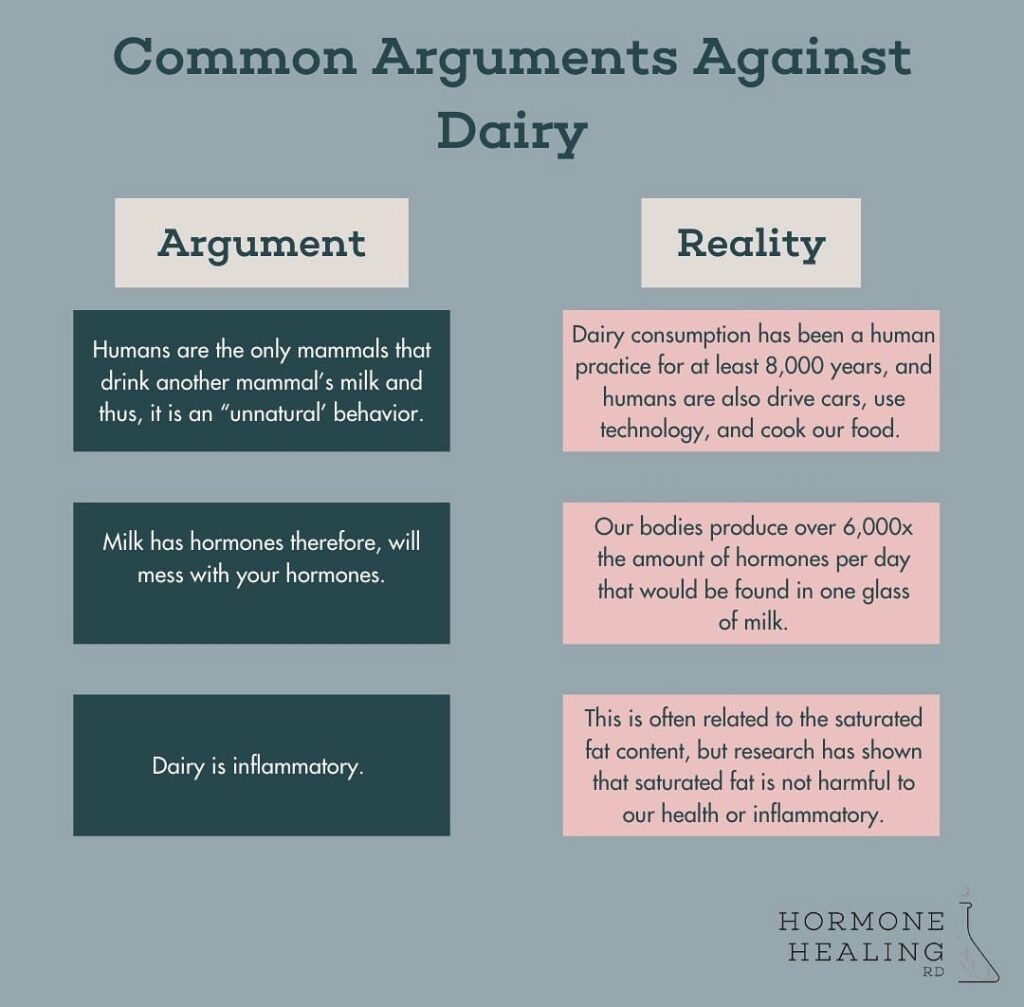
What are the nutritional benefits of milk?
Milk is considered a complete food. One of the coolest things about dairy is its unique macro and micronutrient profile. Milk has a perfect balance of protein, fat, and carbs, making it optimal for supporting blood sugar balance, which reduces the risk of type 2 diabetes. Milk contains a wide range of micronutrients such as vitamins A, B2, B12, K, and D, as well as magnesium, calcium, potassium, selenium, and iron. Dairy is the primary source of calcium in American diets, which is used for building bones and teeth and maintaining bone mass (reducing the risk of osteoporosis). Milk and yogurt provide the potassium needed to help maintain blood pressure. Sounds like a nutrient-dense food, right? Not all milk is created equal, however. Similar to meat, it’s best to consume grass-fed, organic milk whenever possible. If you don’t have access to this, consider lower-fat dairy and consuming it in smaller amounts.
Dairy doesn’t only come from cow’s milk. Goats and sheep produce dairy also. The difference is that cow’s milk is considered A1 dairy because it contains both A1 casein and A2 casein (protein); whereas goat/sheep’s milk is considered A2 dairy because it only contains A2 casein (protein). (A few specific cow breeds also produce A2 dairy). Both versions of dairy contain lactose. The milk protein, along with other nutrients (see image below), is the varying factor. If you experience digestive reactions after consuming cow’s milk, it may be worth it to experiment with A2 milk instead. If digestive symptoms improve after switching to A2 milk, then you could be sensitive to A1 protein.
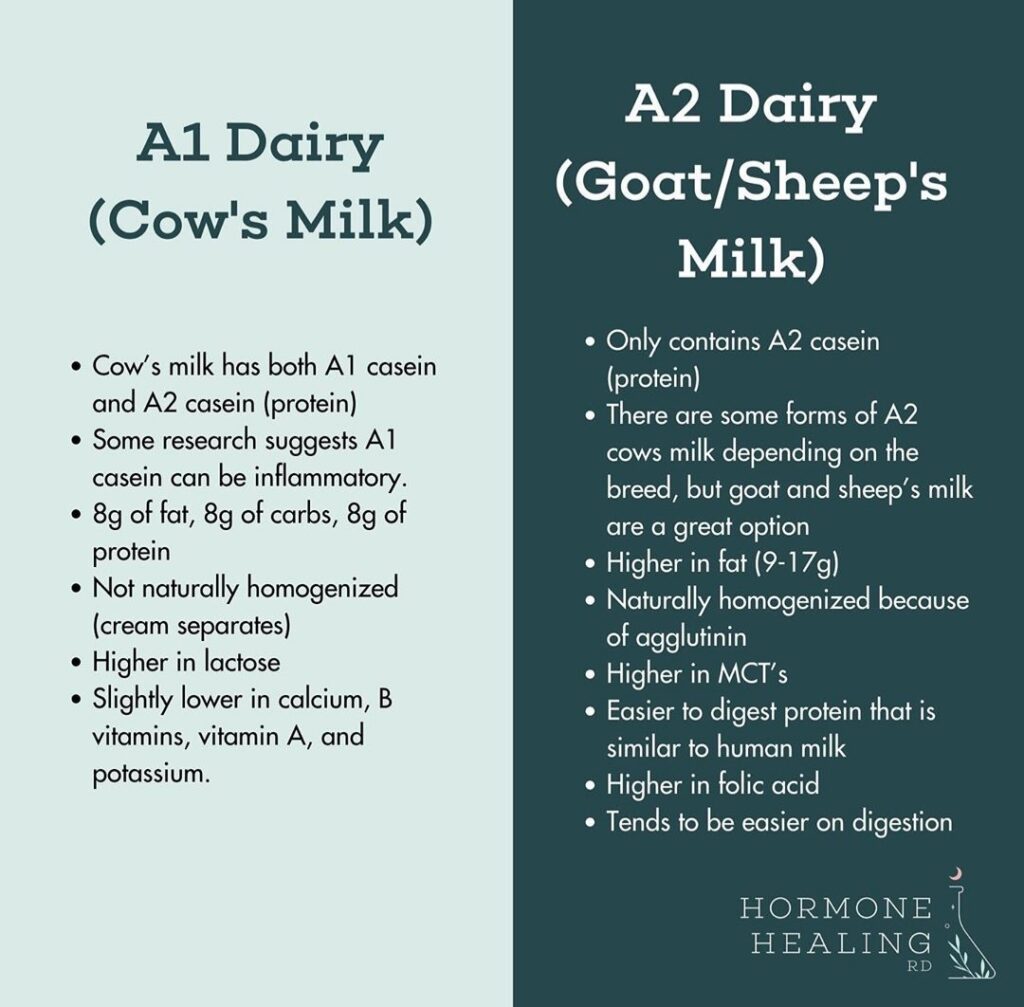
How is milk processed?
Milk Pasteurization- Pasteurization is the process of heating milk to kill pathogens. The main concern with pasteurization is that it kills naturally occurring enzymes in milk that can support overall health and ease the digestive process. It’s thought that many people don’t tolerate regular milk but do better with raw milk. I haven’t always seen this in practice, but I do find most people get more nutritional benefits from raw milk. Raw milk can be challenging to find since it is illegal in many states. You can use this website to locate quality milk near you: www.realmilk.com.
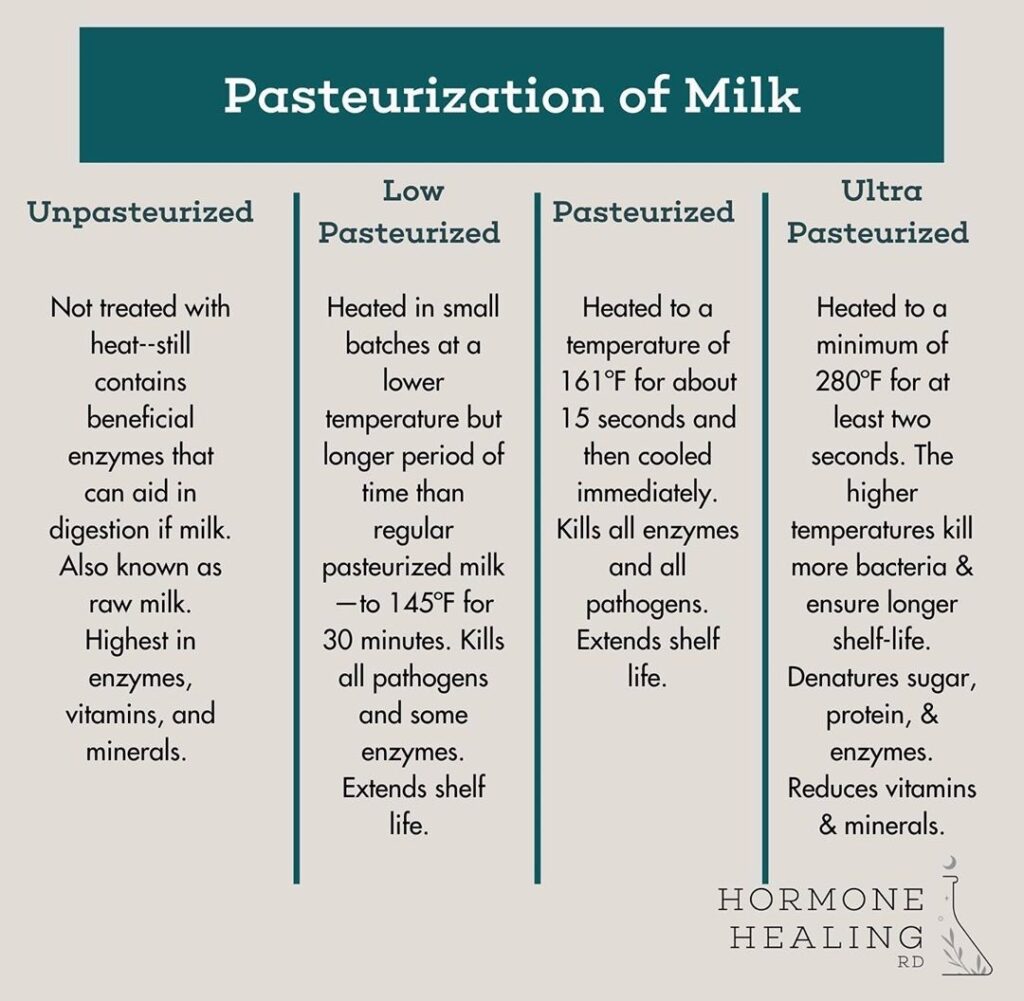
Milk Homogenization- Homogenization is the process of blending the fat molecules in milk, so the fat doesn’t separate from it. The main concern with homogenization is it breaks down casein, the protein in milk, and decreases the availability of other nutrients. Goat and sheep’s milk is naturally homogenized and doesn’t require this process.
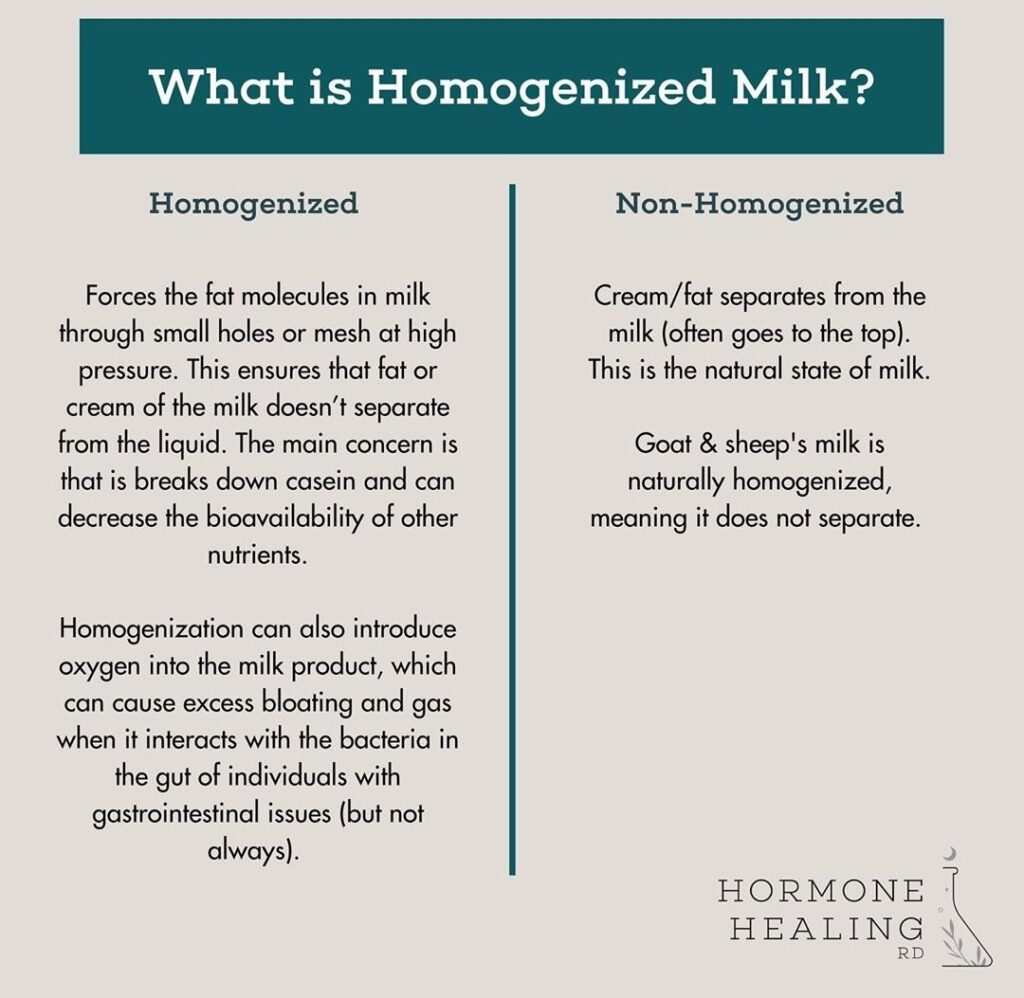
What about milk alternatives?
Aside from why people can’t tolerate dairy, the most common question I get is what milk alternative I recommend. When replacing milk with something else, it is crucial to keep in mind that milk is an extremely balanced food. Just 1 cup of milk contains about 150 calories and 8g of protein, fat, and carbs. Milk is rich in vitamins A, B2, B12, K, and D and contains calcium, magnesium, potassium, selenium, and iron. Before I share my recommendation, I want first to compare some of the popular milk alternatives (see image below):
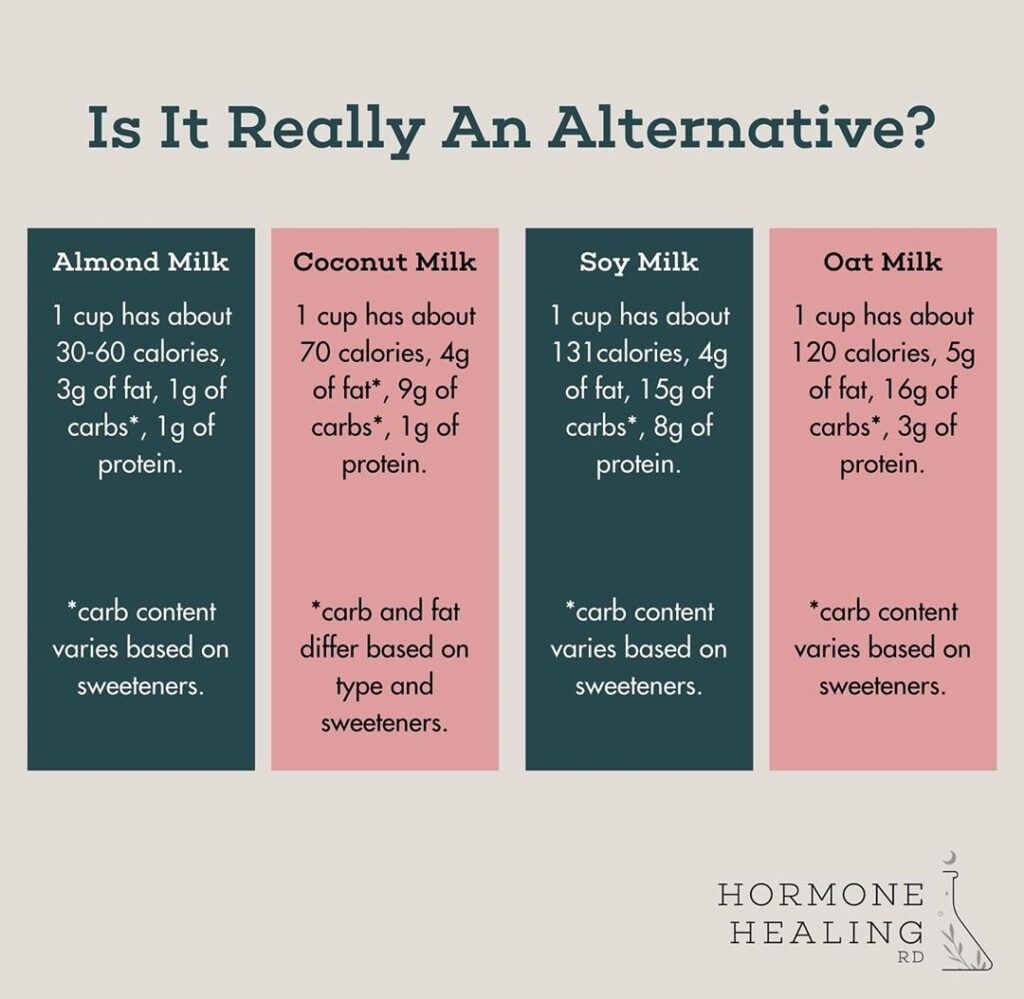
As shown in the image above, none of the milk alternatives have balanced macros like milk. Except for soy milk, all milk alternatives lacked protein. Many people have soy allergies or health concerns when it comes to soy. It also often contains synthetic additives and isn’t the best flavor-wise; therefore, I don’t recommend it. Another concern about milk alternatives is that they all contain anti-nutrients called phytic acid, which bind to minerals and reduce absorption. Both almonds and soy contain polyunsaturated fatty acids, which are less stable and create more stress and inflammation in the body.
What milk alternative do I recommend?
Hands down, I would recommend coconut milk. Coconut milk is much lower in phytic acid. It has saturated fats and medium-chain triglycerides, which are both beneficial for hormone and metabolic health, AND it’s high in potassium (great for thyroid and overall health). The biggest thing to remember is that there is very little protein in coconut milk. If you are using it for a substitute for something like Greek yogurt, you’d want to make sure you add some protein in there (collagen or bone broth protein is a great option).
Digestive issues may not be related to lactose intolerance but rather A1 casein protein. Dairy products are packed with the vital macro- and micronutrients we need and choosing a milk alternative means compromising on nutrients. I am aware that dairy isn’t for everyone. It is ultimately your choice. If you absolutely must take the alternative route, then coconut is the way to go. If you feel you can’t tolerate dairy you should check back here for my next blog where I’ll be discussing possible reasons for dairy intolerance. To hear me answer questions related to dairy, follow me on Instagram @hormonehealingrd and check out the dairy series on my IGTV.
Photo by Tijana Drndarski on Unsplash

https://pubmed.ncbi.nlm.nih.gov/11200362/
https://pubmed.ncbi.nlm.nih.gov/22615395/
https://www.ncbi.nlm.nih.gov/pmc/articles/PMC6875144/
https://pubmed.ncbi.nlm.nih.gov/28162847/
https://pubmed.ncbi.nlm.nih.gov/26814466/
https://pubmed.ncbi.nlm.nih.gov/24260265/
https://pubmed.ncbi.nlm.nih.gov/18080873/